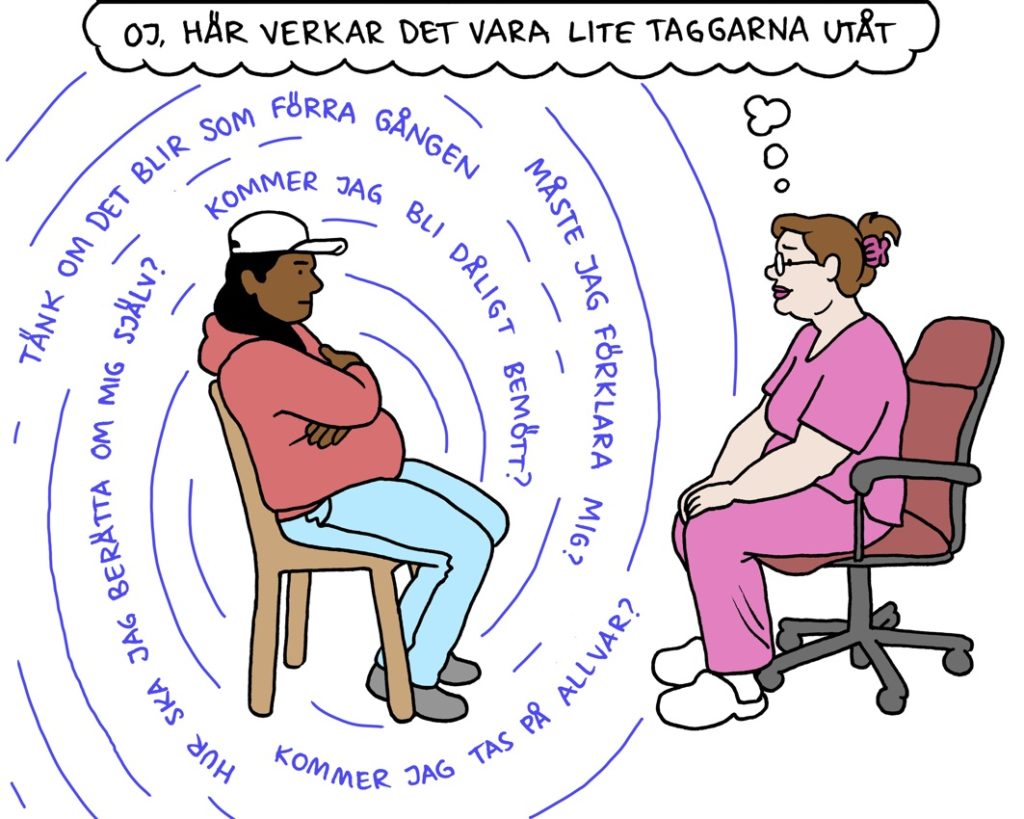Patient interaction tips – minority stress
To be part of a minority group and having to be on one's guard and prepared to be harassed or questioned can lead to psychosocial stress. Scientists call this kind of stress minority stress. In society, there are strong norms regarding gender and sexuality that exclude or make LGBTQI people invisible, exposing them to prejudice, ignorance, hatred, harassment and violence.
Minority stress – a text and an image to reflect on
Even common, more or less subtle, actions can contribute to minority stress. These are called microaggressions. It might be looks, questions or comments that mirror ignorance or prejudice, or exotification – where someone is viewed as eccentric/exotic because of their sexual orientation, gender identity and/or gender expression. Microaggressions are often subconscious acts and they’re sometimes hard for its recipient to pin-point. They often happen repeatedly, and like in the saying “small streams make great rivers” their impact will increase over time. Well-meaning but unfortunate compliments can also serve as microaggressions, as they highlight that the victim deviates from the norm, like for example: “Ah, you’re non-binary, how exciting, I’ll learn loads now!”

Microaggressions are often subconscious acts and they’re sometimes hard for its recipient to pin-point.
Therefore, it’s important to recognise that a comment or question you make might be a comment or question the person has heard numerous times before. That can happen if the question presupposes that the person in front of you lives according to societal norms and ideas about family. Two fathers in a same-sex relationship seeking healthcare for their child might have been asked time and time again where the child’s mother is. A mother who hasn’t given birth to her child might receive the comment: “Mother? Didn’t you say earlier that you’ve never been pregnant and given birth?”
Creating confidence in healthcare contexts
The image illustrates how a constant expectancy of being exposed to ignorance or being questioned can become an obstacle in the interaction with healthcare providers, and how important it is to recognise that the person in front of you might have several negative experiences of interactions with healthcare below their belt. The midwife in the image interprets the pregnant person’s body language as hostile, “spiky”. Sometimes we assume a reserved attitude to protect ourselves. When you as a healthcare worker encounter a person who is thus guarded, you have the opportunity to examine how it affects you. Maybe it makes you curious to see who is behind the stern face? Maybe it makes you fear doing the wrong thing? Some healthcare situations are more challenging for you as a healthcare worker. Thus, it’s important to find different ways to examine what happens in you; what norms are challenged and what emotions are invoked.
By doing this, you as a healthcare worker can find ways to overcome the obstacles for good reciprocal interaction and thereby create a more trusting relationship. It becomes a part of your LGBTQI competence. You as a caregiver also have an obligation to reach out to the patient on their own terms. By reflecting on your language and your preconceptions about gender and sexuality, and by increasing your LGBTQI competence, you have the opportunity to reduce LGBTQI people’s minority stress.
Based on what you know about minority stress, reflect on the following question formulations:
- Do you have any examples of your own of well-meaning comments that might be perceived as microaggressions?
- Do you have examples of less satisfactory interactions? Reflect on how societal norms and ideas may have affected the situation.
- Reflect on how you generally can avoid contributing to minority stress, and how you in your role as a caregiver can lessen LGBTQI people’s minority stress.
Print out the image and text and spread them at your workplace and use them in discussions in your workgroup: Text for reflection, minority stress
More about minority stress
Watch a short film where Anna Malmquist, a researcher at Linköpings Universitet, explains the term and gives tips on how healthcare staff, especially in maternal healthcare, can contribute to lessening minority stress.
